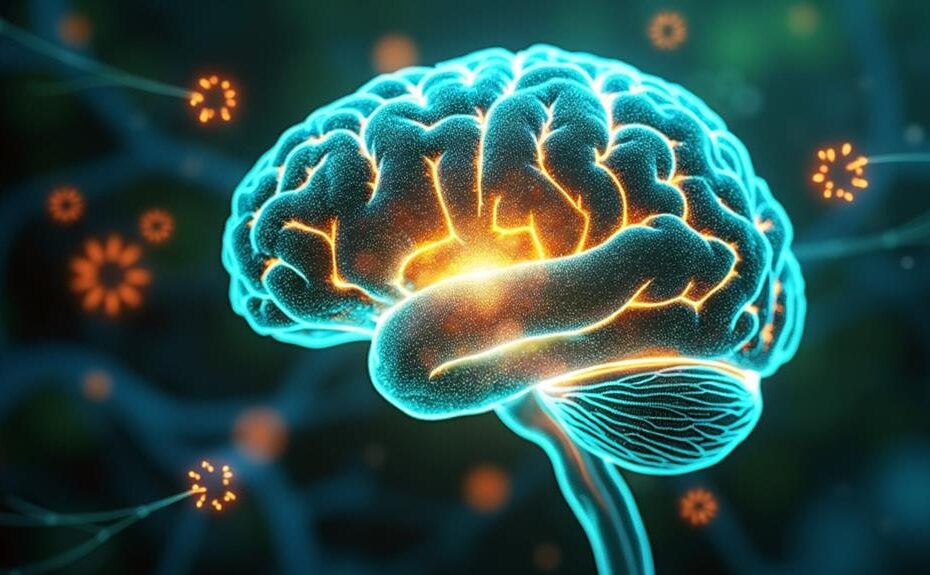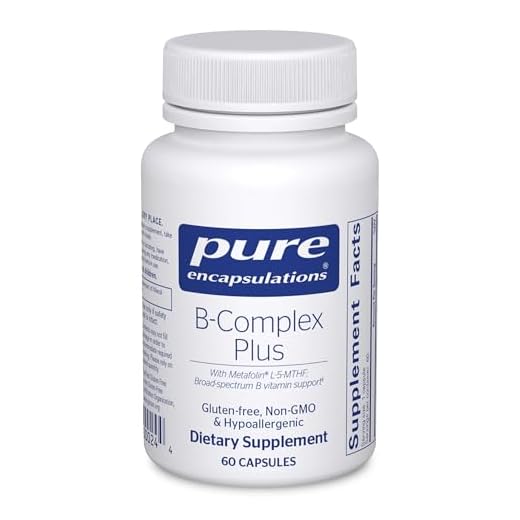







Vitamin B1, or thiamine, is essential for your neurological health. It fuels energy metabolism in your brain and protects the myelin sheath surrounding your nerves. By converting carbohydrates into energy, it supports cognitive function and reduces oxidative stress, key factors in neurodegeneration. Adequate thiamine levels can prevent conditions like Alzheimer's and peripheral neuropathy, while deficiency can lead to severe memory loss and other cognitive issues. Regularly consuming thiamine-rich foods and considering supplements can maintain ideal levels. Understanding these mechanisms can provide deeper insights into preventing neurological disorders effectively.
Key Takeaways
- Vitamin B1 supports energy metabolism by converting carbohydrates into energy, essential for optimal brain function.
- It protects nerve fibers by preserving the myelin sheath, crucial for proper nerve signal transmission.
- Thiamine mitigates oxidative stress, helping to prevent neurodegenerative conditions like Alzheimer's disease.
- Adequate levels of Vitamin B1 are necessary to avoid cognitive decline and neurological disorders linked to its deficiency, such as Wernicke-Korsakoff syndrome.
- Thiamine supplementation promotes neurogenesis, enhancing recovery from neurological damage and supporting overall cognitive health.
Importance of Vitamin B1
Vitamin B1, also known as thiamine, plays an essential role in your overall health, particularly in brain function and neurological well-being. It's critical for carbohydrate metabolism, which supports energy production necessary for ideal brain function and neuronal health. Maintaining adequate thiamine levels is crucial; it helps preserve the integrity of the myelin sheath, protecting nerve fibers and ensuring efficient nerve impulse transmission. Additionally, Vitamin B1's benefits extend to enhancing cognitive function and promoting energy metabolism, making it a fundamental nutrient for individuals concerned about their neurological health.
A deficiency in thiamine can lead to serious neurological disorders, such as Wernicke-Korsakoff syndrome, characterized by cognitive impairments and memory loss. Research shows that adequate thiamine levels may help prevent neurodegenerative conditions like Alzheimer's disease by reducing oxidative stress and inflammation in the brain.
For individuals at risk, such as those with alcohol use disorders, thiamine supplementation can greatly enhance cognitive function and serve as a protective factor against neurological decline. Ensuring you have sufficient vitamin B1 in your diet or through supplementation is critical for safeguarding your cognitive health and mitigating the risk of memory loss and other neurological disorders. Prioritizing thiamine is a proactive step toward maintaining your neurological well-being.
Mechanisms of Action
At the core of neuronal metabolism, thiamine plays a pivotal role in converting carbohydrates into energy, which is essential for peak brain function. As a coenzyme for transketolase, thiamine facilitates the pentose phosphate pathway, generating NADPH and ribose-5-phosphate important for nucleotide synthesis and cellular repair. This pathway helps mitigate oxidative stress, a key factor in neurodegeneration. Additionally, the incorporation of Best Naturals Vitamin B1 can enhance energy levels and mental clarity, further supporting overall cognitive health.
Maintaining adequate thiamine levels supports neuronal health and enhances cognitive function. Thiamine is essential for the synthesis and preservation of the myelin sheath, which protects nerve fibers and guarantees efficient signal transmission. When thiamine levels are insufficient, oxidative stress and inflammation can increase, leading to neurodegenerative disorders, including Wernicke-Korsakoff syndrome.
Moreover, recent research highlights thiamine's role in promoting neurogenesis, the growth of new neurons, and improving recovery from neurological damage. By regulating inflammatory responses and enhancing neuronal survival, thiamine supplementation can counteract the adverse effects of neurodegeneration. Consequently, guaranteeing sufficient thiamine intake is important for maintaining cognitive function and overall neuronal health, ultimately reducing the risk of neurological disorders.
Thiamine Deficiency Consequences
Thiamine deficiency can have profound consequences on neurological health, often leading to debilitating disorders. One of the most severe outcomes is Wernicke-Korsakoff syndrome, which presents with confusion, memory loss, and ataxia. This syndrome stems from thiamine's essential role in brain energy metabolism, as it is fundamental for carbohydrate metabolism and energy production. When thiamine levels drop, you may experience peripheral neuropathy, characterized by numbness, tingling, and muscle weakness, which disrupts the nervous system's overall function. Additionally, prolonged use of diuretics or conditions like alcoholism can increase the risk of deficiency, making awareness of dietary sources imperative for prevention a balanced diet is essential.
Chronic thiamine deficiency can exacerbate neurodegenerative conditions, where insufficient energy supply to neurons results in cell death and cognitive decline. The deficiency impacts neurotransmitter synthesis, hindering communication between neurons and worsening neurological symptoms. Without adequate thiamine, you're at risk of irreversible damage to your cognitive functions and overall neurological health.
Early detection of thiamine deficiency is essential. Addressing the deficiency promptly can prevent severe impairments and restore some neurological functions. If you notice signs of thiamine deficiency, such as memory issues or numbness, seeking medical advice is crucial to mitigate the potential consequences and enhance your quality of life.
Neurological Disorders Linked
Numerous neurological disorders have been linked to thiamine deficiency, underscoring its significant role in brain health. One of the most severe forms is Wernicke-Korsakoff syndrome, which presents with cognitive impairments, confusion, and ataxia, severely impacting memory and coordination. This syndrome exemplifies the consequences of inadequate vitamin B1 levels.
Research indicates that low thiamine levels are associated with an increased risk of developing Alzheimer's disease, highlighting its protective role in cognitive function. Thiamine is essential for glucose metabolism in the brain; without it, neuron death and impaired energy production can occur, leading to further neurological issues.
Additionally, thiamine deficiency contributes to peripheral neuropathy, resulting in pain and loss of sensation in extremities. Chronic alcoholism is a significant risk factor for thiamine deficiency, correlating with a higher prevalence of neurological disorders. This connection emphasizes the importance of adequate vitamin B1 intake, especially for those at risk, to help prevent alcohol-related brain damage. Maintaining ideal thiamine levels is crucial for safeguarding your neurological health and cognitive capabilities.
Symptoms of Thiamine Deficiency
Often overlooked, the symptoms of thiamine deficiency can manifest subtly at first, making early detection challenging. You might start experiencing fatigue, weakness, and irritability, which can progress into more severe neurological symptoms if not addressed. One of the hallmark signs of thiamine deficiency is peripheral neuropathy, where you may feel tingling, numbness, or loss of sensation in your extremities.
In more severe cases, the condition can escalate to Wernicke's encephalopathy, characterized by confusion, ataxia, and ophthalmoplegia. If left untreated, these neurological symptoms can lead to permanent cognitive impairment. Additionally, you may notice cardiovascular symptoms such as rapid heart rate and swelling, which are essential because your brain needs adequate blood flow for maximum function.
Long-term thiamine deficiency can culminate in Wernicke-Korsakoff syndrome, a severe condition marked by significant memory deficits and cognitive dysfunction. This emphasizes the essential role of thiamine, a crucial B-complex vitamin, in maintaining neurological health. Recognizing these symptoms early can help prevent more serious complications, underscoring the importance of adequate thiamine intake in your diet.
Diagnosis and Evaluation
Diagnosing vitamin B1 deficiency requires an extensive clinical evaluation that includes a detailed dietary history to pinpoint intake levels and identify risk factors. You'll need to contemplate symptoms such as confusion and memory issues, which can indicate conditions like Wernicke's encephalopathy. This condition often necessitates a differential diagnosis to rule out other neurological disorders.
Laboratory tests play an essential role in confirming thiamine deficiency. Measuring thiamine levels in the blood and evaluating transketolase activity can provide insight into your neurological health. MRI imaging may reveal characteristic changes in the brain, particularly in the thalamus and mamillary bodies, associated with severe thiamine deficiency.
Regular screening is important, especially for at-risk populations, including alcoholics and individuals with malabsorption syndromes. Early detection of thiamine deficiency can prevent the progression to serious neurological disorders. By understanding the diagnostic process and recognizing symptoms, you can take proactive steps to address potential issues related to thiamine deficiency and safeguard your neurological health.
Treatment Approaches
When addressing vitamin B1 deficiency, effective treatment approaches are fundamental for restoring neurological health. Thiamine, or vitamin B1, plays a significant role in energy metabolism in neurons, making it essential for maintaining cognitive function. For acute thiamine deficiency, treatment typically involves administering 200mg of thiamine intravenously or orally three times daily until symptoms improve, followed by a maintenance dose.
In the case of Wernicke-Korsakoff syndrome, initial treatment requires high doses of thiamine, usually 500mg IV three times a day for two days. This aggressive approach helps counteract neurological damage and supports recovery.
Additionally, thiamine supplementation has shown potential in enhancing neurogenesis and reducing inflammation, suggesting a promising therapeutic avenue for neurological recovery. Continuous monitoring and supplementation are imperative for high-risk populations, such as alcoholics and those with malabsorption syndromes, to mitigate the risk of neurological disorders linked to thiamine deficiency.
Preventive Measures
To effectively prevent neurological disorders associated with vitamin B1 deficiency, it is important to maintain adequate thiamine levels through diet and supplementation. Regularly consuming thiamine-rich foods, such as whole grains, legumes, and pork, supports proper nerve function and helps mitigate the risk of conditions like peripheral neuropathy and Wernicke-Korsakoff syndrome.
Implementing preventive measures involves promoting dietary diversity to guarantee a sufficient intake of vitamin B1. Public health initiatives can raise awareness about thiamine's significant role in neurological health, particularly among populations with high alcohol consumption and limited dietary options.
For individuals at risk, including the elderly and those with chronic illnesses, monitoring thiamine levels is fundamental. Early intervention through dietary adjustments or supplementation can prevent associated neurological complications. Research shows that thiamine supplementation not only improves cognitive function but also reduces symptoms in those already experiencing neurological disorders.
Future Research Directions
Maintaining adequate thiamine levels is essential, but understanding how supplementation can influence neurological health is equally important. Future research should explore the mechanisms by which thiamine supplementation enhances neurogenesis and aids in repairing damaged neural tissues, especially in conditions like Wernicke-Korsakoff syndrome. Investigating the synergistic potential of thiamine combined with anti-inflammatory agents, such as Resveratrol, may yield novel therapeutic strategies for neurodegenerative diseases.
Longitudinal studies are particularly significant in evaluating how thiamine levels impact cognitive decline in aging populations. These studies could provide important insights into thiamine's protective effects against Alzheimer's disease, allowing for early intervention strategies. Additionally, exploring genetic and epigenetic factors tied to thiamine metabolism could reveal individual variations in susceptibility to neurological disorders, paving the way for personalized treatment approaches.
Lastly, research into dietary sources and ideal thiamine intake levels is necessary. This could inform public health strategies aimed at preventing deficiency-related neurological disorders, especially in at-risk populations. By focusing on these areas, we can enhance our understanding of thiamine's role in promoting neurological health and preventing cognitive decline.
Conclusion
In the grand orchestra of your body's health, vitamin B1 acts as the conductor, coordinating essential functions to prevent neurological discord. When thiamine levels drop, it's like a musician missing from the ensemble, leading to chaos and disarray in brain function. By ensuring you get enough B1 through diet or supplements, you're not just supporting your nervous system; you're keeping your body's symphony in harmony. So, prioritize thiamine, and let your brain play its best tune.







